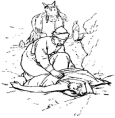New Testament Survey
Parables
A Side Trip into the Land of . . .

Parables

1 Give ear, O my people, to my law: incline your ears to the words of my mouth. 2 I will open my mouth in a parable: I will utter dark sayings of old:
Psalm 78:1-2
Dark sayings or parables are the promised speech of the Messiah. The Apostles question Jesus as to why He spoke in these parables. Jesus’s response is to quote the Psalm.

That it might be fulfilled which was spoken by the prophet, saying, I will open my mouth in parables; I will utter things which have been kept secret from the foundation of the world.
Matthew 13:35
But there is more to the answer than just the fulfillment of prophesy. God had a reason for using parables.

And he said, Unto you it is given to know the mysteries of the kingdom of God: but to others in parables; that seeing they might not see, and hearing they might not understand.
Luke 8:10
In other words, the knowledge of the kingdom is given to the wise while the facts of the kingdom are hidden from the foolish. In this case, the wise are those who listen to, accept, and believe in the Words of Jesus.

Parable is from the Greek parabole which means a placing beside, that is, a comparison or illustration. A working definition of a New Testament parable might be something like “an earthly story with a heavenly meaning.” These were easy to remember stories set in the ordinary events of daily life. For those who heard, these stories had “hidden” spiritual meanings. For those who failed to understand the Person of Jesus, God left their ears closed, just as He had promised. The above statement of Jesus taken from Luke is a quote from Isaiah (taken from the Septuagint). The King James version of Isaiah 6:9 is:

And he said, Go, and tell this people, Hear ye indeed, but understand not; and see ye indeed, but perceive not.
God did not allow the stubborn Israelites to understand because they were lost in sin. For the same reason, the audience of Jesus could not understand because they refused to believe Jesus was the Son of God.
Most of the parables have a single meaning. The details are important to the story, but do not usually add to the spiritual meaning of the parable. The meaning of the parables is always a moral or spiritual truth about the Kingdom of God and how people are to live in the Kingdom.

It is interesting that while John’s Gospel contains figures of speech, his Gospel contains no parables. Some versions do contain the word “parable” in John 10 but in the Greek this is a different word and actually means “proverb.” There are no sayings of Jesus in John comparable to the parables of the synoptic Gospels.

| PARABLE | Matthew | Mark | Luke |
|---|---|---|---|
| >New patches/old cloth | 9:16 | >2:21 | 5:36 |
| >New wine /old wineskins | 9:17 | >2:22 | 5:37-38 |
| >The Sower | 13:3-23 | >4:2-20 | 8:4-15 |
| >Mustard Seed | 13:31 | >4:30-32 | 13:18-19 |
| >Wicked tenants of vineyard | 21:33-45 | >12:1-12 | 20:9-19 |
| >Budding fig tree | 24:32-33 | >13:28-29 | 21:29-31 |
| >House on rock/sand | 7:24-27 | 6:47-49 | |
| >Leaven | 13:33 | 13:20-21 | |
| >Lost sheep | 18:12-14 | 15:3-7 | |
| >Wise steward | 24:45-51 | 12:42-48 | |
| >Tares | 13:24-30 | ||
| >Hidden Treasure | 13:44 | ||
| >Precious pearls | 13:45-46 | ||
| >Dragnet | 13:47-50 | ||
| >Unmerciful servant | 18:23-35 | ||
| >Laborers in vineyard | 20:1-16 | ||
| >Two sons | 21:28-32 | ||
| >Marriage of king’s son | 22:1-14 | ||
| >Wise & foolish virgins | 25:1-13 | ||
| >Ten talents | 25:14-30 | ||
| >Sheep & goats | 25:31-46 | ||
| >Seed growing silently | >4:26-29 | ||
| >Porter on watch | >13:34-37 | ||
| >Two debtors | 7:40-43 | ||
| >Good Samaritan | 10:25-37 | ||
| >Friend at midnight | 11:5-10 | ||
| >Rich fool | 12:16-21 | ||
| >Watchful servant | 12:35-38 | ||
| >Barren fig tree | 13:6-9 | ||
| >Guests who made excuses | 14:16-24 | ||
| >Lost coin | 15:8-10 | ||
| >Prodigal son | 15:11-32 | ||
| >Dishonest steward | 16:1-9 | ||
| >Rich man & Lazarus*** | 16:19-31 | ||
| >Master & servants | 17:7-10 | ||
| >Persistent widow | 18:1-8 | ||
| >Pharisee & publican | 18:9-14 | ||
| >Pounds | 19:11-27 |
***Many commentaries list the story of Lazarus and the rich man as a parable. It may be, however, that this is a real story about hell, designed to show us the torment one encounters. The primary reason for believing this is a real story and not a parable is the use of personal names in the story. No other parable uses personal names. The characters are always referred to by description, the “king,” the “servants,” the “laborers,” the “son,” and so on. I personally believe it is a true story.
![]()

18 For the wrath of God is revealed from heaven against all ungodliness and unrighteousness of men, who hold the truth in unrighteousness; 19 Because that which may be known of God is manifest in them; for God hath shewed it unto them. 20 For the invisible things of him from the creation of the world are clearly seen, being understood by the things that are made, even his eternal power and Godhead; so that they are without excuse: 21 Because that, when they knew God, they glorified him not as God, neither were thankful; but became vain in their imaginations, and their foolish heart was darkened. 22 Professing themselves to be wise, they became fools, 23 And changed the glory of the uncorruptible God into an image made like to corruptible man, and to birds, and fourfooted beasts, and creeping things. 24 Wherefore God also gave them up to uncleanness through the lusts of their own hearts, to dishonour their own bodies between themselves: 25 Who changed the truth of God into a lie, and worshipped and served the creature more than the Creator, who is blessed for ever. Amen. 26 For this cause God gave them up unto vile affections: for even their women did change the natural use into that which is against nature: 27 And likewise also the men, leaving the natural use of the woman, burned in their lust one toward another; men with men working that which is unseemly, and receiving in themselves that recompence of their error which was meet. 28 And even as they did not like to retain God in their knowledge, God gave them over to a reprobate mind, to do those things which are not convenient; 29 Being filled with all unrighteousness, fornication, wickedness, covetousness, maliciousness; full of envy, murder, debate, deceit, malignity; whisperers, 30 Backbiters, haters of God, despiteful, proud, boasters, inventors of evil things, disobedient to parents, 31 Without understanding, covenantbreakers, without natural affection, implacable, unmerciful: 32 Who knowing the judgment of God, that they which commit such things are worthy of death, not only do the same, but have pleasure in them that do them.
Romans 1:18-32
This is the description of our world today. Since humankind has turned from God, God has turned man over to his own sin.
Does this mean that God has closed His ears to the world?
Does this mean we do not need to evangelize?
Most of the world lives in sin today.
Should we be speaking in parables?
